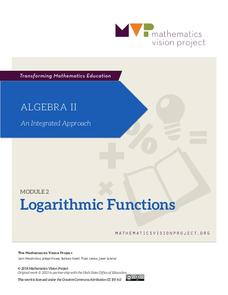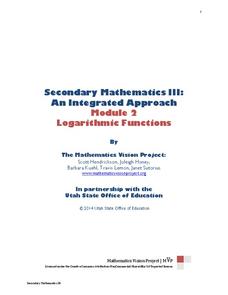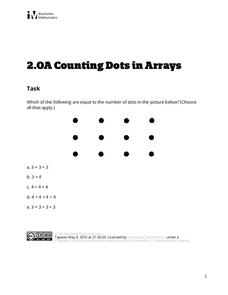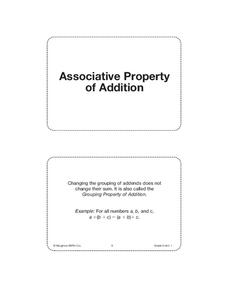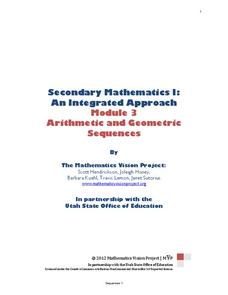Curated OER
New York State Testing Program Practice
In this standardized test preparation worksheet, 8th graders solve several varying problems. This twelve page test preparation worksheet asks students to show their work and explain how they arrived at their answers.
Curated OER
Mammal Morphology - Bats, People, and Other
In this physical characteristics worksheet, students compare bats and humans by putting a + sign in the chart for whether or not bats and humans have the same characteristics. Students do this for 17 characteristics and answer 3 questions.
EngageNY
Mid-Module Assessment Task: Grade 7 Module 2
A seven-question assessment determines how well your learners understand the procedures to add, subtract, multiply, and divide signed rational numbers. Pupils show their understanding through problem-solving situations.
Mathematics Vision Project
Module 2: Logarithmic Functions
You can't build a fire with these logs! Filled with hands-on investigations, a complete logarithmic unit offers both instruction and practice. Learners first build an understanding of the new function, then explore properties before...
Mathematics Vision Project
Module 1: Functions and Their Inverses
Nothing better than the original! Help your class understand the relationship of an inverse function to its original function. Learners study the connection between the original function and its inverse through algebraic properties,...
Mathematics Vision Project
Module 2: Logarithmic Functions
Build a solid understanding of logarithmic functions and equations. Five lessons in the module begin by developing the concept of a logarithm. The next lessons address graphing logarithmic functions, logarithmic properties, and solving...
Mathematics Vision Project
Transformations and Symmetry
Flip, turn, and slide about the coordinate plane. Pupils define the rigid motions and experiment with them before determining the relationships of the slopes of parallel and perpendicular lines. The sixth unit in a nine-part series...
Illustrative Mathematics
Counting Dots in Arrays
Mathematical arrays can represent several different math skills, including counting groups, multiplication, and even area. In this specific task, learners are asked to identify the addition equations that are equal to a 3 x 4 array....
Kentucky Department of Education
Multi-Digit Multiplication Strategies
There is more than one way to solve a multiplication problem, and many learners find that the lattice multiplication method can be a helpful one. Fourth graders take an initial formative assessment before working in groups of two or...
Houghton Mifflin Harcourt
Unit 1 Math Vocabulary Cards (Grade 5)
Associative property of addition, exponents, and variables are a few of the terms that a set of flash cards includes and are designed to support math vocabulary instruction. Cards offer a a bold-faced font as well as a thorough...
Curated OER
Mathematics Problem
Students try to see how many different ways they can spell out the word MATHEMATICS. In this puzzle worksheet, students use the properties of Pascal's Triangle and try to spell out the word Mathematics. There is a solution key with this...
Helping with Math
Addition - Four 4-digit Numbers
Stack up those digits and get your fourth graders adding! This printable handout displays 20 addition problems in which pupils find the sum of four four-digit numbers. With a click of the box in the upper left corner of the web page,...
Los Angeles County Office of Education
Assessment for the California Mathematics Standards Grade 7
In need of an all-inclusive seventh grade math resource? Packed full of the topics necessary for Pre-Algebra the packet includes practice problems with different difficulty levels. It works great for any supplemental use needed...
Helping with Math
Multiplication: 4-digit x 1-digit
As the title states, math whizzes multiply four-digit numerals by a single-digit. With 24 problems to solve and an answer key available, this is a handy tool for providing multiplication practice.
Curated OER
Rational Numbers
In this rational numbers activity, 9th graders solve and complete 16 different problems that include adding and subtracting various rational numbers. First, they determine the sum or difference for each equation. Then, students evaluate...
Curated OER
Evaluating Formulas
In this evaluating formulas activity, 9th graders solve 10 different problems related to various types of formulas used in evaluating equations. First, they determine the value of the indicated variable. Then, students substitute each...
Curated OER
Solving Linear Equations
Ninth graders solve linear equations. In this algebra lesson, 9th graders discuss the steps for solving linear equations and work through examples with the teacher. They work in pairs to create their own linear equation and complete a...
Curated OER
Properties of Exponential Functions
In this algebra learning exercise, students graph exponential equations and use the formula to translate the graph on a coordinate plane. There are 3 word problems.
Mathematics Vision Project
Geometric Figures
Logical thinking is at the forefront of this jam-packed lesson, with young mathematicians not only investigating geometric concepts but also how they "know what they know". Through each activity and worksheet, learners wrestle with...
EngageNY
Solving Logarithmic Equations
Of course you're going to be solving an equation—it's algebra class after all. The 14th installment of a 35-part module first has pupils converting logarithmic equations into equivalent exponential equations. The conversion allows for...
Cornell University
Mechanical Properties of Gummy Worms
Learners won't have to squirm when asked the facts after completing an intriguing lab investigation! Hook young scholars on science by challenging them to verify Hooke's Law using a gummy worm. Measuring the length of the worm as they...
Mathematics Vision Project
Module 3: Arithmetic and Geometric Sequences
Natural human interest in patterns and algebraic study of function notation are linked in this introductory unit on the properties of sequences. Once presented with a pattern or situation, the class works through how to justify...
EngageNY
Estimating Quantities
Apply the concept of magnitude to estimate values and compare numbers. The ninth activity of the 15-part series asks learners to write numbers to their next greatest power of 10 and then make comparisons. Scholars begin to understand the...
EngageNY
Why Were Logarithms Developed?
Show your class how people calculated complex math problems in the old days. Scholars take a trip back to the days without calculators in the 15th installment of a 35-part module. They use logarithms to determine products of numbers and...





